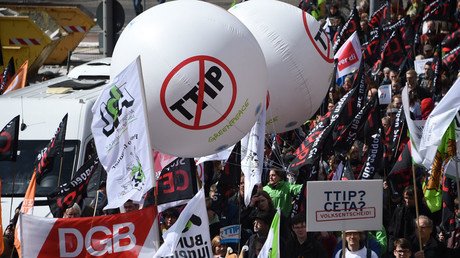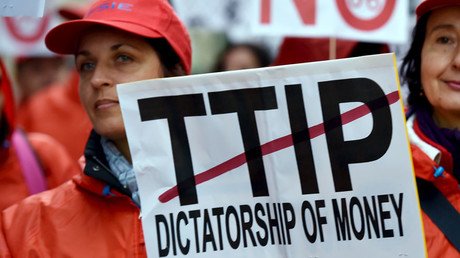As the US and EU continue to secretly debate the controversial Transatlantic Trade and Investment Partnership (TTIP), talks aren’t only taking place behind closed doors. Frustrations are also being aired online, according to emails obtained by Politico.
An email sent on Friday and obtained by the website shows the European Commission warning the 28 EU ambassadors in Brussels that there will be no TTIP deal unless Washington changes its approach to negotiations.
The document focuses on agriculture, one of the most contentious of the 27 chapters currently under negotiation in TTIP talks.
The email expresses the Commission’s concern that “the EU has not seen substantial progress in areas of significant importance to EU agriculture, such as geographical indications, wine and non-tariff barriers.”
It goes on to state that “the US Administration does not yet seem to be in a place where it can reciprocate the EU’s efforts in TTIP and to start delivering on matters of EU interest.”
The email, written from the office of European Agriculture Commissioner Phil Hogan, was agreed upon by several Commission departments, and President Jean-Claude Juncker’s office was aware of it being sent to the EU ambassadors, according to separate emails seen by Politico.
Friday’ email came in response to what the Commission referred to as a “somewhat unusual email correspondence” received on Wednesday from Washington’s ambassador to the EU, Anthony Gardner, that criticized Hogan for making a “series of misleading statements in the press” with a list of the remarks.
READ MORE: Merkel’s TTIP policy is ‘wrong:’ German Vice Chancellor criticizes US-EU free trade deal
In a somewhat ironic statement considering the now public nature of his email, Gardner also said that “while differences of opinion are natural, especially on tough issues like agriculture, they should be aired privately, rather than in the public arena.”
He went on to express Washington’s position that “EU tariffs are 2-3 times as high as US tariffs and EU non-tariff barriers have virtually eliminated many of our key exports.”
However, an internal Commission briefing shared with EU ambassadors and obtained by Politico shows that the European Union has its own concerns over the possible removal of tariffs.
The document cites “substantial gains for US agriculture if tariffs and some non-tariff barriers are fully removed by the EU side. In the applied scenarios the US is a clear winner in trade in agricultural products in TTIP.”
The TTIP has been controversial since it was first proposed. Backers, including US President Barack Obama, stress that it would create the world’s largest free-trade zone, claiming the more integrated marketplace would help small businesses by opening up markets and making customs processes easier. They also say it would reduce trade tariffs on products.
However, many Europeans say the TTIP would place corporate interest above national interest, stressing that international corporations would be given power at the expense of small and medium-sized businesses. The secrecy surrounding the talks has also come under fierce criticism.
In order for the TTIP to come into force, all 28 EU member states and the European Parliament would have to ratify it – a possibility which seems increasingly unlikely. Negotiations on the deal have so far consisted of 13 rounds of talks over the course of three years.


